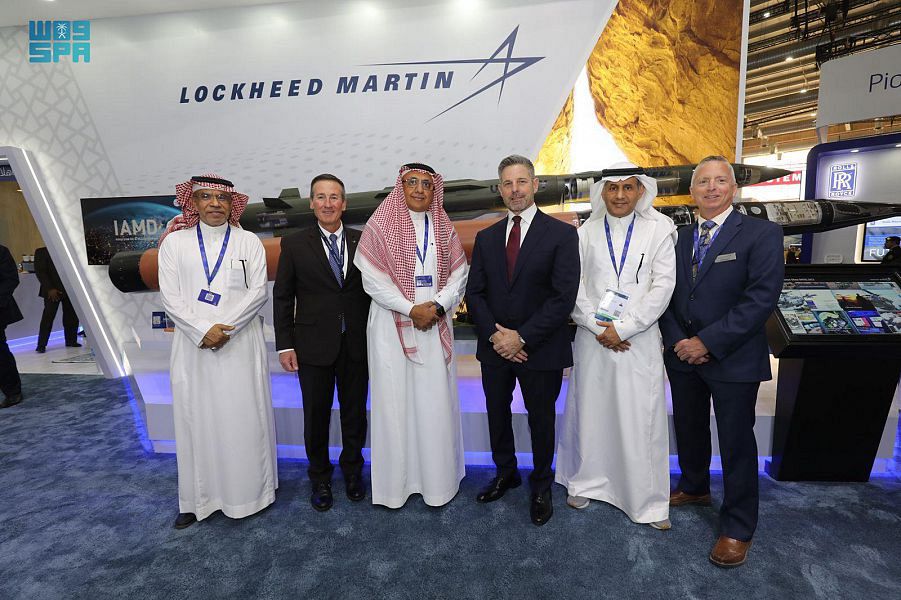
Kingdom ramps up sector with aim to spend half of its military budget with local companies by 2030
JEDDAH: With a recent joint agreement with Saudi Arabian Military Industries (SAMI) to enhance the Kingdom’s defense capabilities and localize its military industry, Lockheed Martin (LM) has become a vital partner in the development of the Kingdom’s defence capabilities as part of Vision 2030.
The agreement states that SAMI will own 51 percent of the joint venture with LM, which aims to establish a research and development center, to be named the KSA Defense Systems Engineering & Technology Center of Excellence (DSTC).
“The DSTC will deliver critical defense mission capabilities to meet the urgent and long-term needs of the Ministry of Defense (MoD) in systems engineering, system integration and test and Research & Technology (R&T) defense domains,” Joseph Rank, the chief executive at Lockheed Martin in Saudi Arabia, told Arab News.
LM will be leveraging its defense and aerospace products and experience to support the General Authority for Military Industries (GAMI) and SAMI, while simultaneously providing human capital development to Saudi employees within the center and establishing a Saudi defense supply chain, he said.
Saudi Arabia’s defense budget is one of the largest in the world – reportedly $80 billion in 2018 – and LM aims to make sure more of this budget is spent at home. When SAMI was launched in 2017 only 3 percent of Saudi Arabia’s defense spending was spent locally. The Kingdom is aiming to increase this to 50 percent by 2030 with the help of LM is part of achieving this target.
“Our plan focuses on two main areas. First, we work closely with the US government to identify technologies that are releasable to our partner nations. Second, we work very closely with the Saudi authorities to identify which localization projects are economically viable and of value to the Kingdom,” explained Rank.
As part of this collaboration, LM has evaluated more than 400 companies in Saudi Arabia to gain a thorough understanding of the Kingdom’s defense needs. “The process is still ongoing, but we are on the way to helping our Saudi partners develop into world-class producers of military equipment,” Rank said.
LM is working across a variety of technologies in sectors such as aviation, cyber, naval and land systems. “The main objective is to bring capabilities that are in line with the requirements and needs of the armed services and assist in the development of these capabilities in partnership with local industrial companies. The focus is on the design, integration, training and lifetime support of military equipment and services,” he added.
The US company has witnessed “some slowdowns” during the pandemic, just like everyone else, but Rank said the impact was minimal. “We have invested heavily in protecting our global supply chains and deployed proactive measures to position ourselves for the fastest possible recovery. Here in Saudi Arabia, we have been impressed by how rapidly our partners and key stakeholders were able to transition to remote working and teleconferencing protocols,” Rank said.
Saudi Arabia’s agility and technology adoption has enabled LM and ensured many initiatives remain on track, he continued.
The Kingdom’s stance on encouraging the development of its people has pushed LM to invest in various educational programs, including funding the MBSC (Mohammed Bin Salman College) for Business in Jeddah, developing technology development curriculums with GAMI and a signed Master Research agreement with King Abdulaziz University in Jeddah.
LM has signed further agreements to develop theory and on-hand training with the King Abdulaziz City for Science and Technology, King Saud University, King Abdullah University of Science and Technology, King Fahd University of Petroleum and Minerals and Jeddah University.
For its future endeavors, the company hopes to support the Saudi Space Commission on several programs through internships and training. The Saudi Geostationary Satellite 1 (SGS-1), manufactured by Lockheed Martin and first launched in 2019, is going to push the Kingdom forward through its space economy journey.
LM has also entered an agreement with the Saudi Technology Development and Investment Company (TAQNIA) to develop space systems, building satellite testing facilities and expecting further expansion in the future.
There is certainly a lot of scope for potential partnership. The CEO of SAMI told Reuters this week the defense company is aiming to be one of the top 25 in the world by 2030, generating annual revenue of $5 billion.












